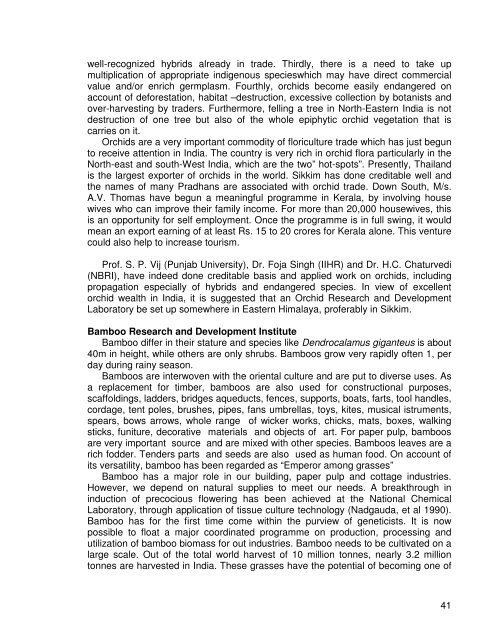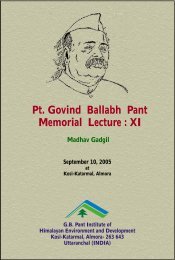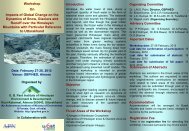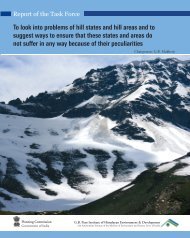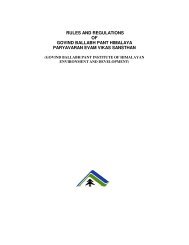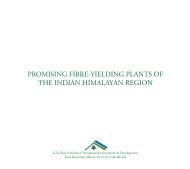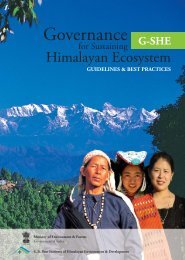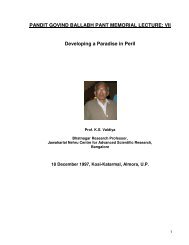Pandit Govind Ballabh Pant Memorial Lecture: II
Pandit Govind Ballabh Pant Memorial Lecture: II
Pandit Govind Ballabh Pant Memorial Lecture: II
You also want an ePaper? Increase the reach of your titles
YUMPU automatically turns print PDFs into web optimized ePapers that Google loves.
well-recognized hybrids already in trade. Thirdly, there is a need to take up<br />
multiplication of appropriate indigenous specieswhich may have direct commercial<br />
value and/or enrich germplasm. Fourthly, orchids become easily endangered on<br />
account of deforestation, habitat –destruction, excessive collection by botanists and<br />
over-harvesting by traders. Furthermore, felling a tree in North-Eastern India is not<br />
destruction of one tree but also of the whole epiphytic orchid vegetation that is<br />
carries on it.<br />
Orchids are a very important commodity of floriculture trade which has just begun<br />
to receive attention in India. The country is very rich in orchid flora particularly in the<br />
North-east and south-West India, which are the two” hot-spots”. Presently, Thailand<br />
is the largest exporter of orchids in the world. Sikkim has done creditable well and<br />
the names of many Pradhans are associated with orchid trade. Down South, M/s.<br />
A.V. Thomas have begun a meaningful programme in Kerala, by involving house<br />
wives who can improve their family income. For more than 20,000 housewives, this<br />
is an opportunity for self employment. Once the programme is in full swing, it would<br />
mean an export earning of at least Rs. 15 to 20 crores for Kerala alone. This venture<br />
could also help to increase tourism.<br />
Prof. S. P. Vij (Punjab University), Dr. Foja Singh (<strong>II</strong>HR) and Dr. H.C. Chaturvedi<br />
(NBRI), have indeed done creditable basis and applied work on orchids, including<br />
propagation especially of hybrids and endangered species. In view of excellent<br />
orchid wealth in India, it is suggested that an Orchid Research and Development<br />
Laboratory be set up somewhere in Eastern Himalaya, proferably in Sikkim.<br />
Bamboo Research and Development Institute<br />
Bamboo differ in their stature and species like Dendrocalamus giganteus is about<br />
40m in height, while others are only shrubs. Bamboos grow very rapidly often 1, per<br />
day during rainy season.<br />
Bamboos are interwoven with the oriental culture and are put to diverse uses. As<br />
a replacement for timber, bamboos are also used for constructional purposes,<br />
scaffoldings, ladders, bridges aqueducts, fences, supports, boats, farts, tool handles,<br />
cordage, tent poles, brushes, pipes, fans umbrellas, toys, kites, musical istruments,<br />
spears, bows arrows, whole range of wicker works, chicks, mats, boxes, walking<br />
sticks, funiture, decorative materials and objects of art. For paper pulp, bamboos<br />
are very important source and are mixed with other species. Bamboos leaves are a<br />
rich fodder. Tenders parts and seeds are also used as human food. On account of<br />
its versatility, bamboo has been regarded as “Emperor among grasses”<br />
Bamboo has a major role in our building, paper pulp and cottage industries.<br />
However, we depend on natural supplies to meet our needs. A breakthrough in<br />
induction of precocious flowering has been achieved at the National Chemical<br />
Laboratory, through application of tissue culture technology (Nadgauda, et al 1990).<br />
Bamboo has for the first time come within the purview of geneticists. It is now<br />
possible to float a major coordinated programme on production, processing and<br />
utilization of bamboo biomass for out industries. Bamboo needs to be cultivated on a<br />
large scale. Out of the total world harvest of 10 million tonnes, nearly 3.2 million<br />
tonnes are harvested in India. These grasses have the potential of becoming one of<br />
41


